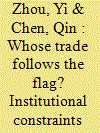| Srl | Item |
| 1 |
ID:
134883


|
|
|
|
|
| Summary/Abstract |
It is widely acknowledged that large-scale urbanization plays a pivotal role in China's miraculous economic growth over the past two decades. Yet many of the basic statistics and facts remain disputable. The contribution of this paper is two-fold. First, based on the publicly available 2000 and 2010 census data, plus some auxiliary information from other sources, we develop an accounting method to back out the scale and composition of China's urbanization. We find that urbanization accounts for 80.4% of the total urban population growth of 211 million in the 2000s. Moreover, more than half of the urbanized population, about 85.6 million, is due to rural–urban migration. Our findings suggest that rural–urban migration increased by two thirds from the 1990s to 2000s, while the population urbanized by land reclassification is roughly the same across the two periods.
|
|
|
|
|
|
|
|
|
|
|
|
|
|
|
|
| 2 |
ID:
182682


|
|
|
|
|
| Summary/Abstract |
This study revisits the association between bilateral relations and trade based on rare-event data from Integrated Data for Event Analysis (IDEA). Our results suggest that a country imports more from another if the two countries are friendlier. We further argue that states face two constraints when attempting to manipulate trade. First, they are constrained by domestic institutions such as elections and congress. Second, they are constrained by international institutions such as the World Trade Organization (WTO). Our results show that the imports of authoritarian countries follow the flag of politics, but democratic countries’ imports are less likely to be affected by bilateral relations. Moreover, WTO membership can gradually restrict democratic states from intervening on imports but has little impact on authoritarian governments.
|
|
|
|
|
|
|
|
|
|
|
|
|
|
|
|